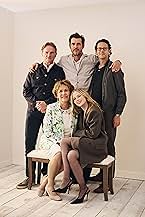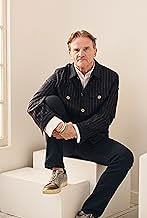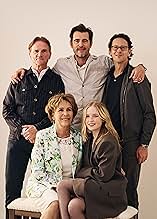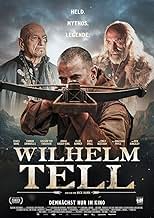Dans la Suisse du XIVe siècle, un chasseur autrefois pacifique mène son peuple à la rébellion après que sa famille et son pays ont été menacés par un roi autrichien tyrannique.Dans la Suisse du XIVe siècle, un chasseur autrefois pacifique mène son peuple à la rébellion après que sa famille et son pays ont été menacés par un roi autrichien tyrannique.Dans la Suisse du XIVe siècle, un chasseur autrefois pacifique mène son peuple à la rébellion après que sa famille et son pays ont été menacés par un roi autrichien tyrannique.
- Réalisation
- Scénario
- Casting principal
- Récompenses
- 1 nomination au total
Résumé
Reviewers say 'William Tell' is lauded for its strong performances, stunning cinematography, and historical authenticity. The narrative of rebellion against tyranny resonates, though dialogue and pacing receive mixed feedback. Some find the script theatrical, and the middle section drags. Historical accuracy and character portrayals are debated. Despite these issues, the film's epic scope and emotional depth make it a compelling historical drama.
Avis à la une
Had to turn it off after so many sea voyages which appeared to be made out as a if they were on the North Sea. Between Switzerland and Austria? Awful. While this was dreadful and mind numbing even as a bit of background noise it became too much to cope with. Not sure why reviews have to be so long so again I'll just say don't bother. Walk your dog for the 5th time today go to the toilet, even if you don't need to. You can read the ingredients on the shampoo bottle, It'll be more entertaining even if you know them word for word. Then move onto the shower gell. Enough words almost now. It's awful cheers.
The movie is pretty poor, overall. But that's not what I'm here to flag... by far the most jarring aspect is they've lifted Al Pacino's Peach With Inches speech from Any Given Sunday, in parts practically verbatim, for Tell's rousing the troops before battle. WTF is that all about??
Not even a little bit, a nod to it, huge chunks.
"In any fight, it's the man whose willing to die..."
"You gotta look at the person sitting next to you, look in the eye and ask that person are you willing to die for me..." but delivered in the least inspiring, spine chilling way that it should make Pacino cry himself to sleep.
Not even a little bit, a nod to it, huge chunks.
"In any fight, it's the man whose willing to die..."
"You gotta look at the person sitting next to you, look in the eye and ask that person are you willing to die for me..." but delivered in the least inspiring, spine chilling way that it should make Pacino cry himself to sleep.
It lacks ...power.
Cinematografic it is a beautiful film. Scenery is ok. Actors are good. Story is good. But it lacks some ...power. And that's on the director. This could have been another Braveheart but the dialogs are tame and i miss the hero on a pedastool. Can't exactly point it out but it is not just not there. Perhaps with another director this could have been a great movie.
Cinematografic it is a beautiful film. Scenery is ok. Actors are good. Story is good. But it lacks some ...power. And that's on the director. This could have been another Braveheart but the dialogs are tame and i miss the hero on a pedastool. Can't exactly point it out but it is not just not there. Perhaps with another director this could have been a great movie.
I watched the world premiere of William Tell at the Toronto International Film Festival (2024).
The presenter of the festival had said before the movie, "they don't make movies like this anymore". I assumed that was a positive thing.
Unfortunately, it really wasn't. The biggest issue of the movie was the language used.
This is a 14th-century period piece that involved the Swiss and Austrians. But for whatever reason the dialogue was written in something that sounded like a high-schooler's approximation of Victorian English.
According to the director, he wrote the dialogue to have language unique to the film. Maybe to assist in some sense of believability within this world. Instead the film was often hard to follow. Character motivations were lost in the flowery, disjointed language.
That being said - the cast did their absolute best with the film. Golshifteh Farahani, Connor Swindells, Rafe Spall, and Ellie Bamber were standouts.
Don't go to see the film for Ben Kingsley - he was barely in it and his performance felt completely phoned in.
If you're okay with 2-hours of mindlessness as you watch beautiful scenery and cool fight scenes - I think there is enough to enjoy.
The movie set up a sequel. I do hope it can be made, and some changes to how dialogue and character interactions are done will be made.
The presenter of the festival had said before the movie, "they don't make movies like this anymore". I assumed that was a positive thing.
Unfortunately, it really wasn't. The biggest issue of the movie was the language used.
This is a 14th-century period piece that involved the Swiss and Austrians. But for whatever reason the dialogue was written in something that sounded like a high-schooler's approximation of Victorian English.
According to the director, he wrote the dialogue to have language unique to the film. Maybe to assist in some sense of believability within this world. Instead the film was often hard to follow. Character motivations were lost in the flowery, disjointed language.
That being said - the cast did their absolute best with the film. Golshifteh Farahani, Connor Swindells, Rafe Spall, and Ellie Bamber were standouts.
Don't go to see the film for Ben Kingsley - he was barely in it and his performance felt completely phoned in.
If you're okay with 2-hours of mindlessness as you watch beautiful scenery and cool fight scenes - I think there is enough to enjoy.
The movie set up a sequel. I do hope it can be made, and some changes to how dialogue and character interactions are done will be made.
An adaptation of Friedrich Schiller's 1804 play of "Wilhelm Tell" and story of the Swiss struggle for independence. Where an act of oppression, followed by unnecessary wrongdoing sparks a response that sets off a chain of events that lead to rebellion. Wilhelm Tell, master of the crossbow, involved in a conflict he would have rather not be a part of..
Visually, the film delivers beautiful landscape shots and a believable period piece, with a nicely-colored and dynamic cinematography and an excellent production! Not to mention a rather large cast of actors that present the material with strong performances.
I've read questioning of the "dialogue", but as a foreigner, I found it was easy to follow at all times and no line particularly annoying or useless.
But.. despite this strong execution, the script lacks surprises, intrigue and excitement. Making the predictable plot an expected retelling of this known story.
Don't get me wrong, it is quite solid and engaging enough.. but for 2-hour film that feels a tad long, I expected something more. It's not what I wanted it to be, but I would recommend it still to those interested and those not familiar with the famous character.
Visually, the film delivers beautiful landscape shots and a believable period piece, with a nicely-colored and dynamic cinematography and an excellent production! Not to mention a rather large cast of actors that present the material with strong performances.
I've read questioning of the "dialogue", but as a foreigner, I found it was easy to follow at all times and no line particularly annoying or useless.
But.. despite this strong execution, the script lacks surprises, intrigue and excitement. Making the predictable plot an expected retelling of this known story.
Don't get me wrong, it is quite solid and engaging enough.. but for 2-hour film that feels a tad long, I expected something more. It's not what I wanted it to be, but I would recommend it still to those interested and those not familiar with the famous character.
Le saviez-vous
- AnecdotesDespite being a national hero in Switzerland, there is no concrete historical evidence that William Tell ever existed.
The earliest written account of the story appears in a 15th-century chronicle called the "White Book of Sarnen", more than a century after the events are supposed to have taken place.
Furthermore, the act of the hero shooting an apple from his son's head stems from the saga of Toko, who was a servant of the Danish King Harald Bluetooth, who died in 985. Likewise, Toko's story was written down more than two hundred years later, in the epic tale "Gesta Danorum".
Many historians view William Tell as a purely legendary figure, though his story was deeply embedded in Swiss national identity by the time of its writing.
- GaffesThe various castles are shown in their modern forms. Specifically, they have a large number of windows. These were all cut several centuries after the period in which the story is set, when castles were no longer required to be fortresses.
- ConnexionsVersion of Guillaume Tell et le clown (1898)
Meilleurs choix
Connectez-vous pour évaluer et suivre la liste de favoris afin de recevoir des recommandations personnalisées
- How long is William Tell?Alimenté par Alexa
Détails
- Date de sortie
- Pays d’origine
- Site officiel
- Langue
- Aussi connu sous le nom de
- Guillermo Tell
- Lieux de tournage
- Sociétés de production
- Voir plus de crédits d'entreprise sur IMDbPro
Box-office
- Montant brut aux États-Unis et au Canada
- 43 088 $US
- Week-end de sortie aux États-Unis et au Canada
- 26 554 $US
- 6 avr. 2025
- Montant brut mondial
- 680 624 $US
- Durée2 heures 14 minutes
- Couleur
- Mixage
- Rapport de forme
- 2.39 : 1
Contribuer à cette page
Suggérer une modification ou ajouter du contenu manquant








































